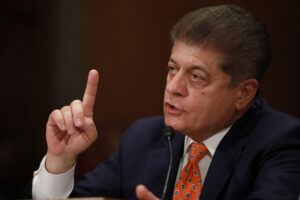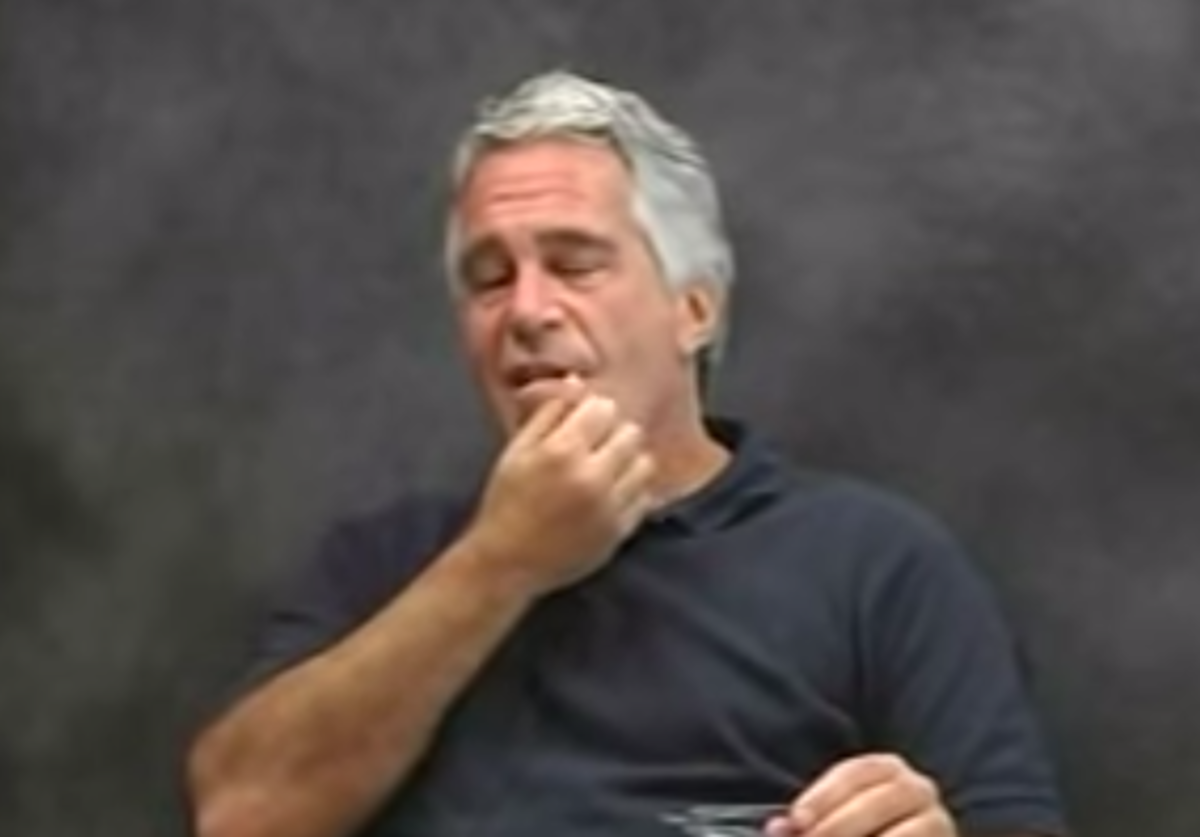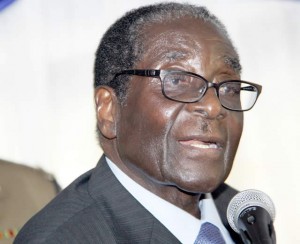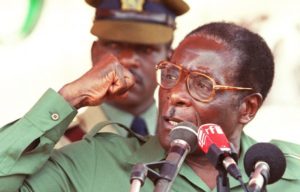The king is dead, and we were wrong. He had not discovered the secret to eternal life; he was not the Bionic President. Robert Mugabe was an ordinary mortal like the rest of us, albeit one who shaped and twisted an entire nation in his image, and now he’s gone to join the others in the Great Presidential Palace in the Sky. The devil had better watch his back.
“I have died many times – that’s where I have beaten Christ. Christ died once and resurrected once.” – Robert Mugabe, on his 88th birthday.
Robert Mugabe presided over an independent Zimbabwe for close on four decades. Thirty-seven years to be exact, until he was unseated through military intervention in 2017. It wasn’t all bad. But it was mostly bad, and the history books that he loved to read will judge him harshly.
He was, from the very beginning, an enigma, a jumble of contradictions that somehow fuelled rather than felled him. He was the Anglophile who hated Britain; the freedom fighter who denied basic rights to his people; the pan-African visionary turned archetypal African dictator; the teacher who refused to learn from his mistakes. He was charming, and he was cruel. He was loved and then reviled.
But one thing never changed. L’ État, c’est Mugabe. Mugabe was Zimbabwe. Now he’s gone, and Zimbabwe has an opportunity to create a new identity.
ACT I: THE REVOLUTIONARY
“The people’s votes and the people’s guns are always inseparable twins.” – Robert Mugabe, in a 1976 speech.
Mugabe’s secret was that he was always the cleverest person in the room. His formidable intellect took him from a modest background into some of the best schools in the land – the best black schools, of course, because he was a second-class citizen in colonial Rhodesia – and then to the University of Fort Hare in South Africa, which was then a production line for extraordinary Africans. Nelson Mandela studied there, as did Oliver Tambo, Julius Nyerere and Kenneth Kaunda.
At Fort Hare, Mugabe studied alongside Robert Sobukwe and Leopold Takawire, and their revolutionary zeal rubbed off on him. Afterwards, he taught for a few years – in northern Rhodesia, and then in Ghana, where he met his first wife – but the dye had already been cast. Mugabe was a freedom fighter, a fluent exponent of the language of pan-Africanism.
His struggle began on his return to Zimbabwe in 1960, where he immersed himself in the underground opposition, eventually taking a senior leadership in the Zimbabwe African National Union (Zanu). In 1964, he was arrested for “subversive speech”, and imprisoned for a decade without charge – a guest of Ian Smith’s brutal regime.
Smith was typically cruel, denying Mugabe permission to attend the burial of his three-year-old son in 1966. This detail is important: later, when their roles were reversed, Mugabe allowed Smith to serve as a member of the Zimbabwean parliament in a powerful gesture of forgiveness and reconciliation. Mugabe was not always a tyrant.
In prison, he studied. Through distance learning, he earned first an undergraduate and then a Master’s degree in law from the University of London, respectively his fifth and sixth university degrees. He had already done another three through correspondence after Fort Hare, and there would be another Masters in his future. This would make him, by quite some distance, the best-educated president on the continent, and possibly the world.
But he was cunning too, exhibiting a ruthless, Machiavellian streak from which none were safe. From prison, he manipulated party processes until he was elected Zanu secretary-general in 1974, side-lining better-known and arguably more accomplished rivals.
After his release later that year, he fled into exile, clutching a portable typewriter as he crossed the border into Mozambique. Even then, he knew that words were his most potent weapon. While the bush war raged around him, Mugabe waged his own personal war against potential rivals both within the party and broader resistance movement. The infighting was vicious, violent and at times deadly, but Mugabe was good at it. By the time Smith was forced to the negotiating table, Mugabe had the party under control and was perfectly positioned to succeed him.
ACT II: THE STATESMAN
“Cricket civilises people and creates good gentlemen. I want everyone to play cricket in Zimbabwe; I want ours to be a nation of gentlemen.” – Robert Mugabe, undated.
Ironically, modern Zimbabwe was born in London, in stately Lancaster House. It was there that the United Kingdom brokered talks between Ian Smith’s Rhodesia and the resistance to white rule; there that the road map to a second independence was created. Elections followed soon after in February 1980, with Zanu – which by now had merged with the Patriotic Front, to create Zanu-PF – winning by a landslide.
For Mugabe, these were halcyon days. For a man with such a thirst for knowledge, what greater privilege could there be than to use that knowledge to create a nation? He set to work creating perhaps the finest education system in Africa and turned Zimbabwe into a breadbasket for the region. Things were looking up, and he was celebrated by his peers and feted by the international community. Mugabe was a bona fide African hero, and he relished the attention.
But all was not as rosy as it seemed in the new republic. Mugabe’s authoritarian streak did not disappear now that he was in power. Quite the opposite, in fact. Joshua Nkomo, another liberation legend, was the highest-profile victim of the prime minister’s growing megalomania. Intimidated and fearing for his life, Nkomo fled into exile in 1983.
Much worse was to come. In Shona, there is a word for the early rains that come before spring, the rains that wash away the useless chaff and give the crops space to grow. That word is gukurahundi. In a message lost on no one in Zimbabwe, it was also the code name of Mugabe’s military operation to pre-empt resistance from the Ndebele community. The Shona were the healthy seeds, to be nurtured, while the Ndebele needed to be washed away.
To do the washing, Mugabe deployed his North Korean-trained Fifth Brigade. Over the course of five years between 1983 and 1987, they purged “dissidents” in Matabeleland and surrounds. Sometimes these were former war veterans, sometimes members of Nkomo’s Zimbabwe African People’s Union (Zapu). Sometimes they were civilians, chosen for no obvious reason except that they were in the wrong place at the wrong time and belonged to the wrong ethnic group. No one knows exactly how many people died because no records were kept. The state did not bother to count its victims. Conservative estimates put the death toll at 8,000 people. The Ndebele themselves say it was closer to 30,000.
Not that anyone outside of Zimbabwe seemed to care. While the Ndebele were dying, Robert Mugabe was forging his reputation as an international statesman. It was only later when his regime started killing white farmers, that he began to be treated like a pariah by the international community.
ACT III: THE DICTATOR
“This Hitler has only one objective: justice for his people, sovereignty for his people, recognition of the independence of his people and their rights over their resources. If that is Hitler, then let me be Hitler tenfold.” – Robert Mugabe, in a 2003 speech.
Mugabe’s transition from freedom fighter to despised despot was slow, and uneven. To each their own moment of revelation, when the scales fell from their eyes and they realised that Zimbabwe’s president had begun to resemble his Rhodesian predecessor.
Perhaps it was gukurahundi. Perhaps it was earlier, when Mugabe murdered and betrayed his comrades in his desperate bid to get ahead. Perhaps it was when he sent Zimbabwean foot soldiers to fight and die in the Democratic Republic of Congo, while he and his generals grew fat off smuggled minerals. Perhaps it was when he authorised the seizure of white-owned farms, and encouraged his thugs to take the land by force. Perhaps it was when he printed money to buy loyalty, tanking the economy in the process. Perhaps it was when he stole the 2002 election, or when he beat and bullied the opposition out of an outright victory in the 2007 poll.
Perhaps it was all of these things. Or perhaps it was none of them. For even now, with everything we know about what Mugabe did, he could draw a crowd. He could stand up at the African Union, aged 92, and rail against imperialism and homosexuality, and receive a standing ovation. When he was on form, he was charming, and eloquent, and he knew how to work an audience. A consummate, charismatic politician. There’s no question that his support was dwindling. But equally, there’s no question that his support remains more substantial than his opponents would like to believe. Some of the grief on display in Zimbabwe will be real.
The celebrations will be too, however. For too long, Mugabe ruled Zimbabwe as his personal fiefdom, abusing the state and its resources to keep himself in State House, no matter what the cost.
Of course, it wasn’t the money that motivated him – his second wife, Grace, was the big spender – but the power.
And so these last few years must have been torture. As the vultures circled, and his age became more apparent, his authority dwindled into nothing. He wasn’t calling the shots, not in the state or the party, and his orders were no longer obeyed without question. Kept in position while rival factions sought to further their own agenda, by the time he was ousted he had been reduced to a stumbling figurehead. This sudden, precipitous demotion, from all-powerful to near puppet, was a shock to the system, and surely hastened his demise.
The king is dead. Yes, there will be mourning. Some will miss him. But most will mourn the devastating, perhaps irreversible damage he’s done to the country that he promised to cherish and serve so many years ago.
Robert Mugabe’s death is no tragedy; but his life, ultimately, was. DM
Robert Mugabe: The life and times of the former Zimbabwe leader (Supplied by MSN)
1/26 SLIDES © Philimon Bulawayo/Reuters
Robert Mugabe led Zimbabwe beginning in 1980, first as its prime minister and then as its president since 1987. One of the most controversial presidents in the African world, he was re-elected to presidency multiple times before resigning on Nov. 21, 2017.





 Joe Patrice is a senior editor at Above the Law and co-host of Thinking Like A Lawyer. Feel free to email any tips, questions, or comments. Follow him on Twitter if you’re interested in law, politics, and a healthy dose of college sports news. Joe also serves as a Managing Director at RPN Executive Search.
Joe Patrice is a senior editor at Above the Law and co-host of Thinking Like A Lawyer. Feel free to email any tips, questions, or comments. Follow him on Twitter if you’re interested in law, politics, and a healthy dose of college sports news. Joe also serves as a Managing Director at RPN Executive Search.










 The king is dead, and we were wrong. He had not discovered the secret to eternal life; he was not the Bionic President. Robert Mugabe was an ordinary mortal like the rest of us, albeit one who shaped and twisted an entire nation in his image, and now he’s gone to join the others in the Great Presidential Palace in the Sky. The devil had better watch his back.
The king is dead, and we were wrong. He had not discovered the secret to eternal life; he was not the Bionic President. Robert Mugabe was an ordinary mortal like the rest of us, albeit one who shaped and twisted an entire nation in his image, and now he’s gone to join the others in the Great Presidential Palace in the Sky. The devil had better watch his back.





